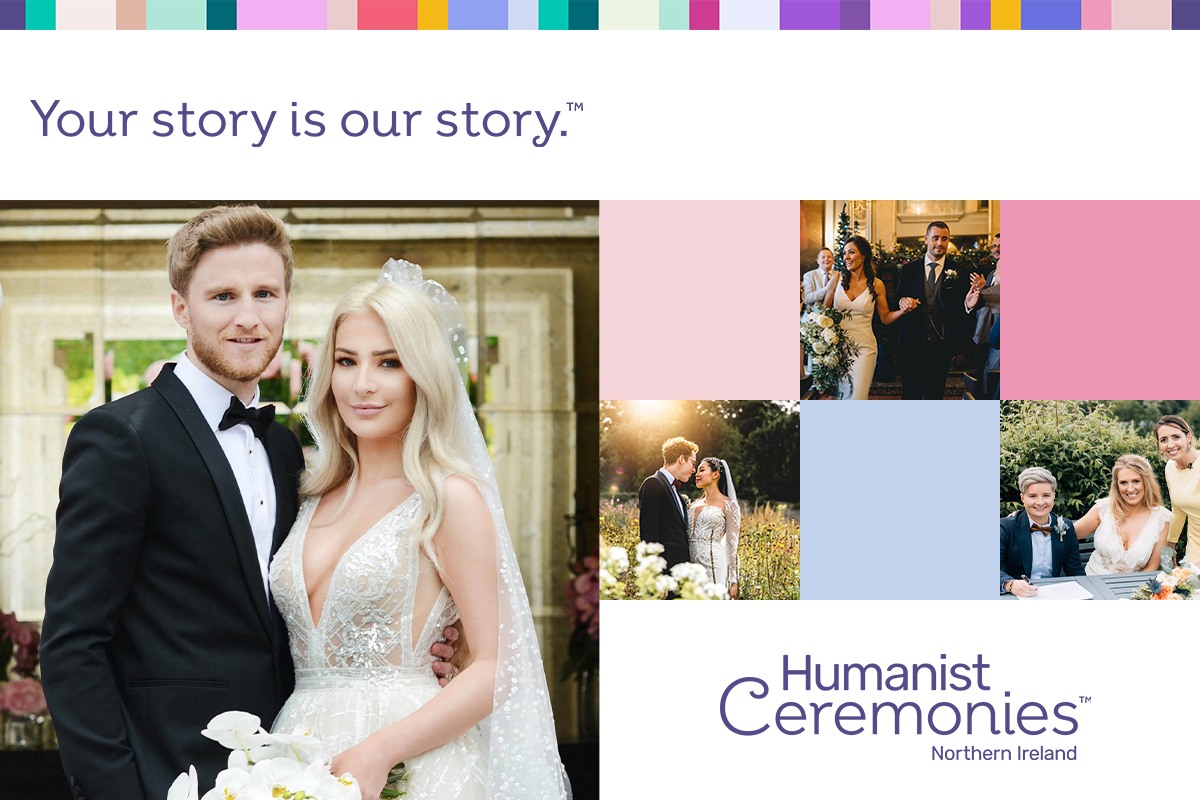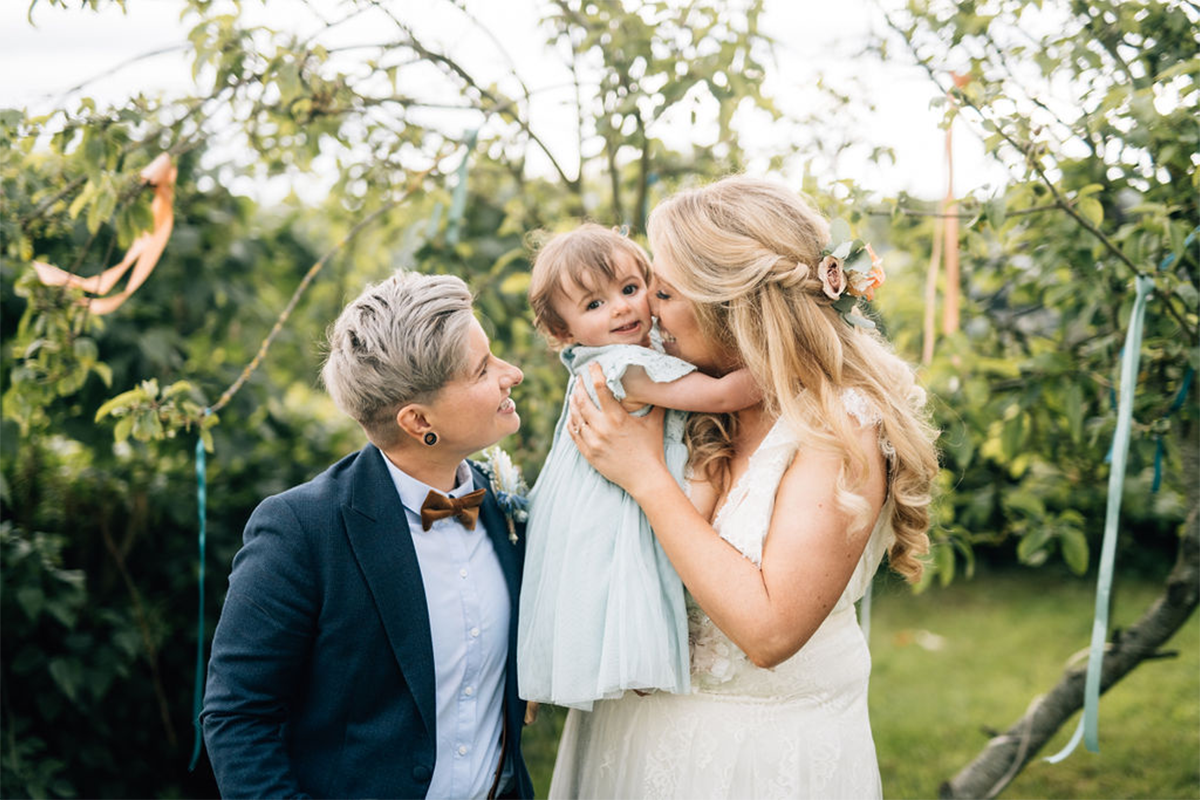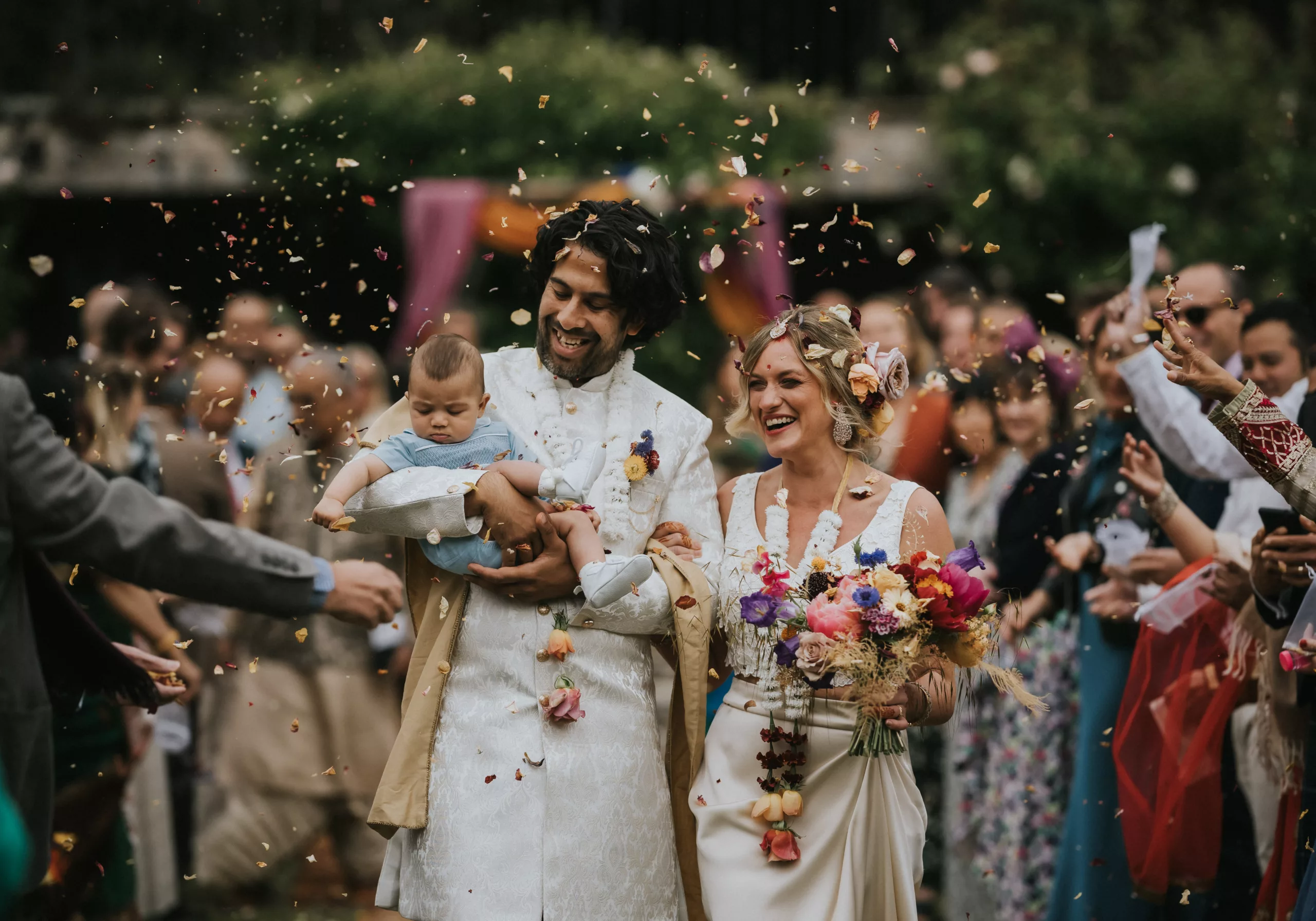
We’ve just marked the fifth anniversary of a historic moment in Northern Ireland. This time in 2018 was a season of love – when legally recognised humanist marriages became a reality on the ground in Northern Ireland. A watershed moment for equality!
Today, we’re taking a look at how one couple fighting for love changed the law for everyone – and the impact that humanist marriages have had in just five years.
Fighting for love: Laura and Eunan’s story
Model Laura Lacole and footballer Eunan O’Kane were married on 22 June 2017 after a legal battle to win equality for humanists in Northern Ireland.
After a High Court victory, countless legal papers, and lots of emails exchanged with the General Register Office, justice was served and history was made.
After months of fighting, their day had come. And it was a personal day tailored just for them. It celebrated their values, their beliefs, and their love. It was their humanist wedding!
Prior to this, there had never been a humanist marriage recognised in law in Northern Ireland! For many decades, humanists wanting to get married had to jump through hoops and get married ‘twice’.
It took a court case to prove that this was unlawful under the Human Rights Act, and that the Government was inappropriately treating religions better than it was treating humanists.
But even after all of that, the newlyweds had to go back to the Court of Appeal to fight an appeal, which could have meant legally recognised humanist marriages would never happen again for anyone else! In short, they didn’t stop fighting after they got their special day.
Thankfully, with support from the team at Northern Ireland Humanists and their brilliant lawyers, the couple triumphed again. For the first time, humanists across Northern Ireland would soon be able to have a humanist marriage if they wanted one.
In total, it took over a year for the ruling to come and then it took a few more months for the General Register Office to put in a system of authorisation for humanist celebrants. This meant the first legal humanist marriages under the new framework didn’t happen until late August 2018!
A legacy of positive change
Five years on, because of Laura and Eunan’s selfless activism and the hard work of Northern Ireland Humanists, today 40 celebrants trained and accredited with Humanist Ceremonies NI now conduct legally binding wedding ceremonies – and practically everyone in Northern Ireland has heard of them.
To celebrate the five year anniversary, we’re sharing five thoughts on what this momentous anniversary means for Northern Ireland (and the rest of the UK, too).

1) Equality, equality, equality 💕🌈🌟
Prior to 2018, humanists in Northern Ireland had to have ‘two’ weddings if they wanted a humanist ceremony. A meaningful and memorable non-religious humanist ceremony that reflected their humanist values and views on marriage… and a perfunctory registrar one.
Since 2018, thousands of people in Northern Ireland have now been married by a celebrant from Humanist Ceremonies NI. For humanist couples, this isn’t just about the perfect ceremony. It is an equality issue. The change in status reflects something very personal and meaningful: equal recognition for humanists from the government at the most important moment of their lives.
In 2020, same-sex marriages also came to Northern Ireland, thanks in part to the hard work of Humanists UK in getting the UK Parliament to change the law. Since then, all our celebrants have performed same-sex marriages, and same-sex couples are disproportionately likely to choose a humanist marriage.
Equality is woven into the very fabric of Humanist Ceremonies NI. We welcomed the change in the law on same-sex marriages with a nationwide billboard campaign declaring ‘Love Wins’.

2) Progress… but also, heritage! 🍀
Humanist Ceremonies Northern Ireland today is the product of over 125 years of excellence in performing humanist ceremonies in Northern Ireland and the rest of the UK.
Humanist ceremonies date back to the 1890s when humanists around the UK sought to create something unique that reflected their view of the world, and offer couples choice against society’s expectations of Christian funerals, weddings, and baptisms.
In Northern Ireland, this work took on special importance in the 20th century, when labels like ‘Catholic’ and ‘Protestant’ often kept loving couples apart. While humanists still faced discrimination for being non-religious, humanist activists wondered then if non-religious couples choosing humanist ceremonies could, in the future, help to bring families together…
Northern Ireland is a different place today. Yet today’s humanist celebrants are still privileged to see that mixing of families and backgrounds play out. People from religious backgrounds attending humanist ceremonies invariably comment on how inclusive, moving, and personal they find them to be.

3) Quality, personalisation, and professionalism ✅
What today sets Humanist Ceremonies Northern Ireland, Humanist Society Scotland Ceremonies, and Humanist Ceremonies by Humanists UK™ apart from everything else that came before is a relentless focus on personalisation and quality, reflecting the uniqueness and the equal rights of every human being.
The humanist view of life places emphasis on living well in the here and now, making this one life count, and treating others as they’d like to be treated. In ceremonies, this leads to a subtle but profoundly meaningful shift in what (and who!) rites of passage are for: people! This emphasis helps to explain why today ‘Humanist Ceremonies’ has come to stand for care, attentiveness, and quality.
Over nearly 130 or so years, Humanist Ceremonies celebrants learned from each other and formed a network of practice and excellence. Everything they discovered went into a perfect ceremony then helped to inform unbeatable, world-class training and development for humanist celebrants, and an unmatched quality commitment to clients.
Reflecting this, following Laura and Eunan’s wedding, 98% of couples who chose a Humanist Ceremonies NI celebrant since 2018 rated them – and their ceremony – a full 5/5, meaning ‘Excellent, with no room for improvement.’

4) Ahead of England and Wales… still 😶
Prior to 2018, humanists in Northern Ireland had to have ‘two’ weddings if they wanted a humanist ceremony. A meaningful and memorable non-religious humanist ceremony that reflected their humanist values and views on marriage… and a perfunctory registrar one.
Since 2018, thousands of people in Northern Ireland have now been married by a celebrant from Humanist Ceremonies NI. For humanist couples, this isn’t just about the perfect ceremony. It is an equality issue. The change in status reflects something very personal and meaningful: equal recognition for humanists from the government at the most important moment of their lives.
In 2020, same-sex marriages also came to Northern Ireland, thanks in part to the hard work of Humanists UK in getting the UK Parliament to change the law. Since then, all our celebrants have performed same-sex marriages, and same-sex couples are disproportionately likely to choose a humanist marriage.
Equality is woven into the very fabric of Humanist Ceremonies NI. We welcomed the change in the law on same-sex marriages with a nationwide billboard campaign declaring ‘Love Wins’.

5) A legacy: inspiring more campaigners 👊💥
In December 2018, Laura and Eunan were awarded ‘Humanist of the Year’ by Humanists UK – alongside two of their lawyers, Steve McQuitty and Ciaran Moynagh – for their inspiring efforts.
In the time since, they’ve provided a template for more such activism. Today Northern Ireland Humanists is one of the busiest and most dynamic parts of Humanists UK. It has a thriving volunteer network and is engaged in a number of important campaigns to reform the law and create a fairer society.
Among some of Northern Ireland Humanists’ current campaigns are ongoing efforts to repeal Northern Ireland blasphemy’s law. It has also been working with MLAs and others on a campaign to ban ‘pray-the-gay-away’ so-called conversion therapy. And it is calling for overdue reforms of religion in schools.
On the latter point, a Belfast-based father and his son were successful in court just last year. A judge ruled that Northern Ireland’s current approach to RE and collective worship (both of which are invariably Christian in NI schools) breached the human rights of humanists and needed to change.
What is a humanist marriage?
Humanist weddings are non-religious wedding ceremonies that are fully customised to match the deepest-held values and beliefs of the couple getting married. They are conducted by a humanist celebrant, someone guaranteed to share their beliefs. In consultation with the couple the celebrant produces a completely bespoke script. The ceremony also occurs in whatever location is most meaningful for the couple. Humanists UK has more than 300 trained and accredited wedding celebrants across England, Wales, Northern Ireland and crown dependencies.
